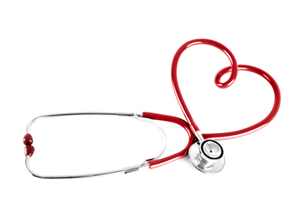HEALTH - FOCUS ON YOUR HEALTH
Keeping your Heart Healthy
February, 2013 - Issue #100
 |
www.valenciadentalarts.com). "The presence of common problems in the mouth, including gum disease (gingivitis/periodontal disease), cavities and missing teeth, were as good at predicting heart disease as cholesterol levels. People with periodontal disease - an infection of the tissues and bones that surround and support teeth - are almost twice as likely to have coronary artery disease," explains the doctor.
Studies have also found that people who had higher blood levels of certain disease-causing bacteria in the mouth were more likely to have atherosclerosis in the carotid artery in the neck. Clogging of these carotid arteries can lead to stroke. Why take the risk? Boost your oral hygiene and make sure you visit your dental professional twice a year for cleanings and check ups. A little bit of prevention can go a long way!
Cardiology - AVH Designated STEMI Receiving Center
Door-to-Balloon Time Under One Hour for Antelope Valley Hospital Patients
Over a span of five years, the initiative to improve "door-to-balloon time" (the interval of time it takes for a hospital to treat a heart attack patient after he or she arrives at the hospital) for people experiencing out-of-hospital myocardial infarction has resulted in significantly lower transport and treatment times of ST-segment elevation myocardial infarctions (STEMI). Data shows that from 2005 to 2010, door-to-balloon time declined from a median of 96 minutes to 64 minutes nationally. Antelope Valley Hospital is one of 33 hospitals that are a part of L.A. County's designated STEMI Receiving Centers. They reported an average door-to-balloon time of 54 minutes for 2011, well below the national standard of 90 minutes set by the American College of Cardiology. This could not have been possible without close coordination between various departments, including but not limited to the Emergency Room, Cardiac Cath Lab and EMS services.
These improvements have been due to AVH...
• Working closely with L.A. County as a STEMI Receiving Center
• Being part of national and local initiatives to help improve this time
• Identifing "exceptional" performers within the region and nationwide and analyzing their methods
• Identifing strategies and observing process-flow to identify areas where they could "shave minutes" off door-to-balloon times
Antelope Valley Hospital continues to work diligently to improve door-to-balloon times and is also looking ahead and helping the American College of Cardiology track a new test measure, medical contact-to-balloon time, which will greatly improve the care they provide to patients in our community that might have a heart attack. 949-5000 www.avhospital.org
Heart Disease Medication Tips for Better Health
Medication needs for heart disease vary from person to person. Once a doctor finds the best drugs to relieve a person's heart disease symptoms and improve his or her sense of wellbeing, it's important for the patient to take their medications regularly.
Here are some guidelines:
• Heart disease drugs that relax constricted blood vessels may cause dizziness. If you get dizzy when standing or getting out of bed, sit or lie down for a few minutes. This will increase your blood pressure. Then, get up more slowly.
• Don't take less medication than your doctor prescribes in order to save money. You have to take the full amount in order to get the full benefits. If drug costs are too high, talk with your doctor or pharmacist. Organizations such as the Partnership for Prescription Assistance (www.pparx.org 888-477-2669) may be of help in paying for your prescription medications.
• Don't take any over-the-counter drugs or herbal therapies until you've consulted with your doctor or pharmacist.
• If you're going to have surgery with a general anesthetic - including dental surgery - tell your doctor or dentist what heart medications you're taking.
• Keep a current list of the medications you are taking, both prescription and non-prescription.
Care for your heart by participating in one or more of Henry Mayo's Heart Smart activities in February. These activities offer free health education materials, nutrition and smoking cessation information and a series of health screenings. Information can be found at the hospital's website or by calling. 200-1306 www.henrymayo.com
|
||||||||||||||||||||||||||||




